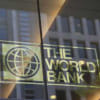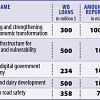‘WB funds to cover both refugees, host community’
The World Bank has offered financial assistance to Bangladesh to help Rohingya refugees and their host community in Cox's Bazar where the extreme poverty rate is more than 40 percent.
The bank on November 13 sent an aide-memoire to the External Resources Division (ERD), expressing its willingness to provide assistance in the areas of health, nutrition and population service; water, sanitation and hygiene; social protection and livelihood; environmental improvement, access road and disaster risk management; and education and life skill development.
A six-member WB team prepared the aide-memoire after touring Bangladesh from October 22 to November 4. The delegation visited Cox's Bazar and had meetings with officials of different ministries.
The global lender has sought a feedback from the finance ministry by November 26. On the basis of the feedback, a proposal will be place before the WB board to provide the assistance.
Sources at the ERD said they would convey their opinion to the WB after receiving opinions from the ministries concerned.
Amid atrocities on Rohingyas in Myanmar, termed ethnic cleansing by the UN, Bangladesh shared its scarce resources with over 6 lakh Rohingyas, who crossed the border in just around three months since late August, and gave them shelter. Over three lakh Rohingya nationals were already in Bangladesh following previous influxes.
The WB said, “We recognise that the influx has placed an immense strain on existing infrastructure and services that would adversely impact the host communities. Therefore, bank support will be designed to respond to the needs of both the host communities and the displaced Rohingya population.”
According to the aide-memoire, the overall impact of the Rohingya influx on the Bangladesh economy is uncertain, given that the Cox's Bazar region accounts for comparatively a smaller part of the country's economic activities.
The host communities near and around the refugee camps were the worst affected. Rohingyas took shelter in the southern upazilas of Cox's Bazar, where extreme poverty rates exceed 40 percent against the national average of 13 percent; and many more locals were vulnerable to changes in prices and wages, said the WB.
It said market studies were underway to monitor changes in the price of key food stuffs and wage rates, but evidence suggest that the influx led to increases in some commodity prices, as well as distortion in the labour market as Rohingyas seek work wages below existing rate.
The WB said tourism was also being affected from various angles.
The lender said the Bangladesh government would have to prepare an “eligibility paper” outlining its action plan and strategy for the displaced Rohingyas and their host population to get the financial assistance.
About the institutional coordination arrangements, the WB said coordination on the ground should be stepped up as the assistance programme would require an inter-ministerial response. This should include clarifying responsibilities within the government as well as ensuring a strong coordination with the external partners.
Such coordination is critical to ensure effective use of scarce resources, the bank added.
The lender said the government agencies would define specific intervention strategies, including a budgetary estimate, in the areas identified above.
The WB further said its existing projects could be restructured to provide additional finance for service delivery in Cox's Bazar.

 For all latest news, follow The Daily Star's Google News channel.
For all latest news, follow The Daily Star's Google News channel. 







Comments